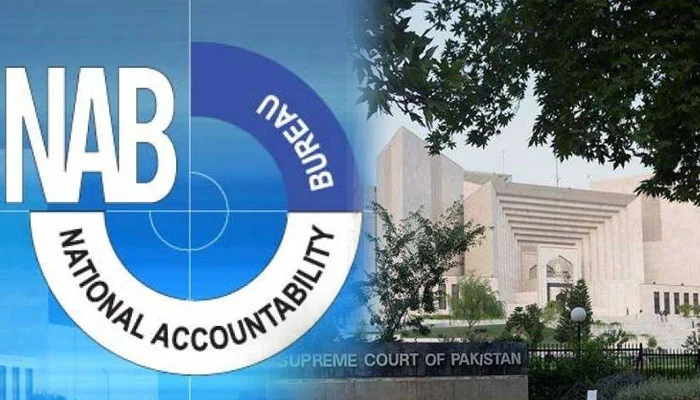SC seeks reply of law ministry, NAB & other respondents on petition filed by Imran Khan against NAB amendments
CJP Umar Ata Bandial says Parliament is the sovereign body; we have always held that parliament should be fully functional
ISLAMABAD ( Web News )
A special bench of the Supreme Court of Pakistan headed by Chief Justice of Pakistan Justice Umar Ata Bandial and comprising Justice Ijazul Ahsan and Justice Syed Mansoor Ali Shah on Tuesday criticised the Pakistan Tehreek-e-Insaf’s (PTI) “walk over” to the incumbent government in the parliament.
Hearing a petition filed by Pakistan Tehreek-e-Insaf (PTI) Chairman and former prime minister Imran Ahmad Khan Niazi regarding amendments to the National Accountability Bureau (NAB) law, the Chief Justice of Pakistan (CJP) Umar Ata Bandial inquired into PTI’s restraint from parliamentary debate on recent amendments to the National Accountability Ordinance (NAO) 1999. Federation of Pakistan through secretary, law and justice division, Islamabad and others have been made party in the petition.
The CJP implored the PTI Vice President Makhdoom Shah Mahmood Qureshi. CJP inquired whether Shah Mahmood Qureshi understood the question of court? CJP addressing Shah Mahmood said when the NAB amendments were being carried out where were you? CJP said how much strength of PTI is in the parliament, think for country, nation and constitution. Advocate Khawaja Haris Ahmad appeared on behalf of the ousted premier. The bench issued notices to law ministry, NAB and other respondents named in the petition as questions were raised by counsel and are to be taken into consideration.
During the hearing, the chief justice asked the former foreign minister why PTI did not object to the legislation, related to amendments, in the parliament.
CJ Bandial urged the former ruling party to consider participating in the assembly, “for the sake of people and the country.” He also lamented the current economic situation. The CJP stated that the functioning of the parliament was necessary for the progress of the country. “Parliament is the sovereign body; we have always held that parliament should be fully functional,” he added.
The court remarked that several issues brought to judicial bodies were the domain of the parliament. “These issues should be debated in the parliament so that the court may spend time to decide litigant cases.”
Justice Syed Mansoor Ali Shah questioned the PTI counsel on the matter of parliamentary debate, stating that serious questions would arise on the locus standi of the petitioner, as to why they did not participate in the debate.
Justice Ijazul Ahsan disapproved of the former ruling party’s “complete walk over to the government” stating that the party could have raised objections on the legislation. Justice Ijazul Ahsan remarked that all these points should have been raised in the assembly.
In response, Shah Mahmood Qureshi refused to discuss the party’s reason for walking out of the parliament. However, the former foreign minister stated that two attempts were made to amend the NAB laws but consensus could not be evolved.
He said that the PML-N-led coalition government had previously suggested 34 amendments, which were not acceptable as they could have made accountability law “completely redundant”.
Imran Khan counsel Khawaja Haris Ahmad argued that the parliamentary system and Islamic provisions are features of the constitution and these amendments affected these features.
The counsel also objected to amendments regarding the definition of assets beyond means as well as misuse of authority. Khawaja Haris further raised questions on the recent amendment which define the offense of Benami.
Khawaja Haris contended that under the new amendments, material obtained through Mutual Legal Assistance (MLA) could not be placed as evidence before an accountability court. He said that the amendment was created to benefit those accused involved in fake account cases.
Subsequently, the bench did not pass a restraining order which would halt the operation of the new law and adjourned the hearing until July 29.
According to a private TV channel, Chief Justice of Pakistan Justice Umar Ata Bandial said it was his opinion that the matter of revisiting the National Accountability Bureau’s (NAB) law will be returned to the Parliament, as there is no alternative to the forum.
“In my opinion, this matter will be referred back to Parliament. There is no substitute to Parliament […] and we cannot take away its powers,” the CJP said
The bench remarked that Law Minister has said that the new amendments are as per the rulings of the apex court; however, PTI counsel rejected the notion and said that the changes were made in a hurry and are against ruling of the court.
CJP remarked that the court can nullify laws that are enacted to benefit certain individuals; however, he stressed that hurdles should not be created in functioning of the government as public servants are hesitant to take decisions due to NAB laws.
The court remarked that anyone who commits corruption should be severally dealt with but a necessary decision taken by him should not also be set aside.
The PTI chairman had filed a petition in the apex court under Article 184 (3) of the Constitution, claiming that the bill has “virtually eliminate[d] any white-collar crime committed by a public office holder”.
The Parliament’s joint session last month passed the National Accountability (Amendment) Bill, 2022, which curtailed the anti-graft watchdog’s authority and reduced remand days among other amendments.
However, the PTI, whose lawmakers had resigned en masse from the National Assembly, were not present to oppose the changes and later opted to challenge the amendments in the top court.
The SC, after hearing the arguments of PTI lawyer Khawaja Haris Ahmad and former foreign minister Shah Mahmood Qureshi, adjourned the hearing till July 29 (Friday) 11:00 AM, while also issuing notices to NAB, the federal government, and the attorney-general for Pakistan to present their side of the story at the next hearing.

